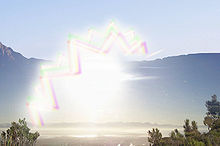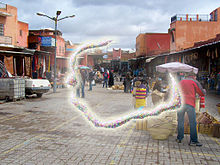- Aura (symptom)
-
For other uses, see Aura (disambiguation).
Migraine with aura (classical migraine) Classification and external resources ICD-10 G43.1 ICD-9 346.0 Migraines - Migraine
- Prevention of migraines
- Aura
- Cortical spreading depression
- ICHD classification and diagnosis of migraine
- Retinal migraine
- Familial hemiplegic migraine
- Sporadic hemiplegic migraine
An aura is the perceptual disturbance experienced by some migraine sufferers before a migraine headache, and the telltale sensation experienced by some people with epilepsy before a seizure. It often manifests as the perception of a strange light, an unpleasant smell or confusing thoughts or experiences. Some people experience aura without a subsequent migraine or seizure (see silent migraine).
When occurring, auras allow epileptics time to prevent injury to themselves and/or others. The time between the appearance of the aura and the migraine lasts from a few seconds up to an hour. The aura can stay with a migraine sufferer for the duration of the migraine, depending on the type of aura this can leave the person disoriented and confused. It is not uncommon for migraine sufferers to experience more than one type of aura during the migraine. Most people who have auras have the same type of aura every time.
Auras can also be confused with sudden onset of panic, panic attacks or anxiety attacks creating difficulties in diagnosis. The differential diagnosis of patients who experience symptoms of paresthesias, derealization, dizziness, chest pain, tremors, and palpitations can be quite challenging.[1]
Contents
Examples
An aura sensation can include some or a combination of the following:
Visual changes
- Bright lights and blobs
- Zigzag lines
- Distortions in the size or shape of objects
- Vibrating visual field
- Scintillating scotoma
- Shimmering, pulsating patches, often curved
- Tunnel vision
- Scotoma
- Blind or dark spots in the field of vision
- Curtain-like effect over one eye
- Slowly spreading spots
- Kaleidoscope effects on visual field
- Total temporary monocular (in one eye) blindness (in retinal migraine)[2]
- Heightened sensitivity to light
Auditory changes
- Hearing voices or sounds that do not exist: true auditory hallucinations
- Modification of voices or sounds in the environment: buzzing, tremolo, amplitude modulation or other modulations
- Heightened sensitivity to hearing
- Someone speaking at a level and normal tone sounds like they are shouting loudly
Other sensations
- Strange smells (Phantosmia) or tastes (Gustatory hallucinations), or where food and drinks taste different than usual
- Heightened sensitivity to smell
- Feelings of déjà vu or confusion
- Feelings of numbness or tingling on one side of the face or body
- Feeling separated from one's body
- Feeling as if the limbs are moving independently from the body
- Feeling as if one or multiple limbs are growing
- Feeling as if the mouth is too small for the teeth inside
- Feeling as if one has to eat or go to the bathroom
- Feeling as if one is going to vomit
- Anxiety or fear
- Weakness, unsteadiness
- Saliva collecting in the mouth
- Being unable to understand or comprehend spoken words during and after the aura
- Being unable to speak properly, such as slurred speech or gibberish, despite the brain grasping what the person is trying to verbalize (aphasia)
- Temporary amnesia, such as forgetting how to do tasks you have been doing for years
Uses
The specific type of sensation associated with an aura can potentially be used in an attempt to localize the focus of a seizure.
Auras share similar symptoms with strokes, but onset is more gradual with auras.[3] Auras can last from several seconds to as long as an hour, and can sometimes end with feelings of extreme tiredness, weakness, heart palpitation, sweating and warmth throughout one's body.
The onset of an aura can provide an early warning for those experiencing migraines.
See also
References
- ^ Sudden Onset Panic: Epileptic Aura or Panic Disorder? Robin A. Hurley, M.D., Ronald Fisher, M.D., Ph.D. and Katherine H. Taber, Ph.D.
- ^ Robert, Teri. "Living Well With Migraine Disease and Headaches" New York HarperCollins 2004
- ^ Better Health Channel. Stroke and Migraine. Government of Victoria, Australia. Accessed August 18, 2007.
External links
- About.com aura summary
- Epilepsy.com information
- Migraine Aura Foundation
- MAGNUM, the National Migraine Association
- Epilepsy Action information
- Migraines with 'aura' raise women's stroke risk
Seizures and epilepsy (G40–G41, 345) Basics Seizure types · Seizure trigger · Breakthrough seizure · Postictal state · Epileptogenesis · Seizure prediction · Aura (warning sign)Treatments Antiepileptics · Template:Anticonvulsants (for list) · Electroencephalography (diagnosis method) · EpileptologistRelated disorders Epilepsy organizations Epilepsy Foundation (USA) · International Dravet Epilepsy Action League · Epilepsy Toronto · Epilepsy Research UK · Epilepsy Action Australia · Citizens United for Research in Epilepsy · Epilepsy Action · Epilepsy SocietyIssues for epileptics Seizure types
Epilepsy typesPartial/focal Seizures: Simple partial · Complex partial · Jacksonian seizure
Epilepsy: Temporal lobe epilepsy · Frontal lobe epilepsy · Rolandic epilepsy · Nocturnal epilepsyGeneralised Tonic-clonic · Absence seizure · Atonic seizure · Automatism · Benign familial neonatal · Lennox-Gastaut · WestStatus epilepticus Myoclonic epilepsy Non-epileptic seizures
Wikimedia Foundation. 2010.


